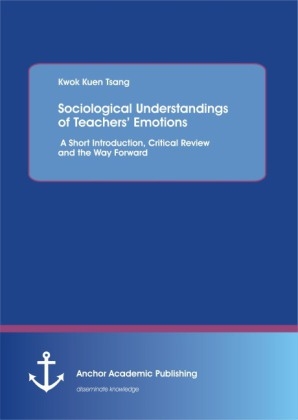
Sociological Understandings of Teachers¿ Emotions: A Short Introdution, Critical Review, and the Way Forward
Anchor Academic Publishing (Verlag)
978-3-95489-322-5 (ISBN)
Dr. Kwok Kuen Tsang is an assistant lecturer of the Hong Kong Institute of Technology. He receives his Ph.D. in the sociology of education from the University of Hong Kong.
Text Sample:
Chapter 1:
Teaching has been regarded as a very stressful and exhausting profession in the world (Corcoran & Tormey, 2012; Gavish & Friedman, 2010). It is particularly true in the twenty-first century, because all over the world many education reforms, which restructure education systems with a market logic and managerial approach, intensify teachers responsibilities and in turn make teachers suffer from work overload and the lack of leisure time (Valli & Buese, 2007). Consequently, teaching seems to become a less enjoyable occupation.More and more teachers all over the world have been identified as feeling stressed, exhausted, depressed, frustrated, dissatisfied, unhappy, demoralized, and alienated (Brooks, Hughes, & Brooks, 2008; Bullough, 2011; Cheng, 2009; Hargreaves, 2003; Hu lsheger, Lang, & Maier, 2010; Iltaf & Gulzar, 2013; Jeffrey & Woods, 1996; Kelchtermans, 1996, 2011; Lee & Yin, 2011; Leithwood & Beatty, 2008; Little, 1996; Mahony, Menter, & Hextall, 2004; Marshall & Ball, 1999; Morgan, Ludlow, Kitching, O'Leary, & Clarke, 2010; Santoro, 2011; Saunders, 2013; Trentini, 2012).The consequences of the negative emotions of teachers are twofold. First, negative emotions directly affect teachers psychological well-beings (Day &Qing, 2009). Research has demonstrated that a chronic experience of negative emotions such as stress, anxiety, depression, and exhaustion are positively correlated to mental and psychological disorders (Lau, Chan, Yuen, Myers, & Lee, 2008; Tang, Au, Schwarzer, & Schmitz, 2001; Yeung & Liu, 2007). In an extreme case, the negative emotions contribute to teachers suicide or self-harm (Leung, 1994). As witnessed between 2005 and 2010, for instance, there were at least eleven teachers who committed suicide because of intense feelings of job stress, exhaustion, and burnout in Hong Kong (Ng, 2010). Second, teachers negative emotions affect the quality and effectiveness of teaching (Sutton, 2005). Research has showed that teachers positive emotions like satisfaction and enjoyment are positively related to teachers motivation, self-efficacy, innovation, and commitment in teaching, while negative teachers emotions are negatively related to these sources of teacher effectiveness (Choi & Tang, 2011; Sutton, 2005; Sutton & Wheatley, 2003). Thus, Hargreaves said, good teaching is charged with positive emotion (1998b, p. 835) which is absolutely central to maintaining and improving educational quality in our schools (1998a, p. 315). Therefore, there is a growing body of literature which investigates the patterns of teachers emotions in order to find ways to improve teachers psychological well-beings and the quality of teaching (Corcoran & Tormey, 2012; Day & Lee, 2011; Day & Leitch, 2001; Hargreaves, 1998a, 2003; Kelchtermans, 2005; Nias, 1996; Saunders, 2013; Schutz & Zembylas, 2009; Tsang, 2014b; Zembylas, 2005c)
| Erscheint lt. Verlag | 16.2.2015 |
|---|---|
| Sprache | englisch |
| Maße | 155 x 220 mm |
| Gewicht | 171 g |
| Themenwelt | Sozialwissenschaften ► Soziologie ► Allgemeine Soziologie |
| ISBN-10 | 3-95489-322-3 / 3954893223 |
| ISBN-13 | 978-3-95489-322-5 / 9783954893225 |
| Zustand | Neuware |
| Haben Sie eine Frage zum Produkt? |
aus dem Bereich


